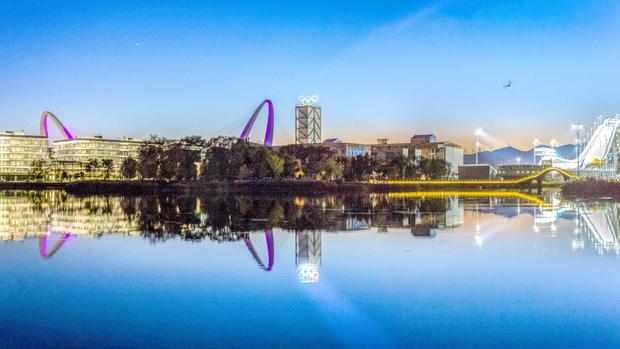 The Beijing Winter Olympics Park, which hosts the Games' organizing committee, operating center, the Big Air Shougang ski jumping and snowboarding venue and other facilities. (LIU XINGHUA / XINHUA)
The Beijing Winter Olympics Park, which hosts the Games' organizing committee, operating center, the Big Air Shougang ski jumping and snowboarding venue and other facilities. (LIU XINGHUA / XINHUA)
Case studies highlighting the benefits that have already resulted from preparations for the Beijing 2022 Winter Olympics and Paralympics were released on Jan 17 by the Beijing Organising Committee for the 2022 Olympic and Paralympic Winter Games.
The “Legacy Case Studies of the Olympics and Paralympic Winter Games Beijing 2022” contains seven individual reports covering sports, the economy, social, cultural and environmental areas, urban development and regional development.
China and its people have benefited before the start of the Beijing Winter Games, which start on Feb 4, through the years of preparation since winning the bid for the Games in 2015. Even after the Games are finished, their legacies will benefit the nation’s sustainable development.
“Guided by the International Olympic Committee and International Paralympic Committee, the Beijing 2022 organizing committee remains committed to the green, inclusive, open and clean approach to hosting the Olympic and Paralympic Winter Games,” the Beijing committee said in a statement.
“Preparations for the Games are proceeding steadily and promises have been honored. In addition to focusing on the Games and building a stage for world athletes to compete fairly and surpass themselves, the organizing committee has placed great emphasis on legacy sustainability.”
The most direct legacy of the Beijing 2022 Games is the positive influence on the development of national winter sports. The number of Chinese people who have participated in winter sports training, amateur or professional competitions, and outdoor and indoor winter sports-related leisure activities has reached 346 million, according to the report. The figure surpasses the goal of 300 million set in 2015, when Beijing won the right to host the Games.
Seven National Public Ice and Snow Season festivals have been held successfully since 2014, the report on the sports legacy cases said. The eighth started in December and will continue throughout the Beijing Winter Olympics and Paralympics until April.
During the annual festival, winter sports and other ice and snow recreational events are staged and participation encouraged. People of different ages and occupations are welcomed to attend and enjoy fun activities. More than 4,700 events have been held since 2014.
The other six reports on legacy case studies cite a large number of examples of how the nation will benefit from nonsports Olympic legacies.
These include the sustainable future use of Beijing 2022 venues, 5G technology development in co-host city Zhangjiakou, Hebei province, and the protection of wild animals in Beijing’s suburban Yanqing district, one of three competition zones.
“The formulation and execution of the strategic plan for the Beijing 2022 Winter Games strive to create a wealth of legacies in seven major fields, allowing the Olympics to play a more active role in driving coordinated urban and regional development and social progress,” the committee’s statement said.
“As preparations for Beijing 2022 come to an end, legacies are emerging rapidly in these fields. More and more people are benefiting or will benefit from these legacies over a long period of time.”


